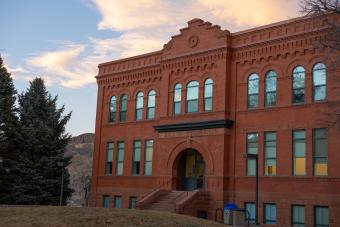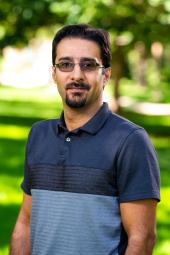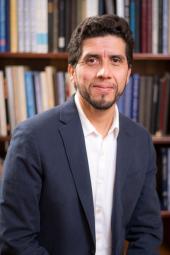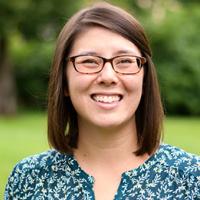Mohsen Asle Zaeem, Moises Carreon named Fryrear Chairs for Innovation and Excellence
Endowed by Mines alumnus Ben Fryrear '62, the position drives strategic initiatives, programs that further vision, mission of Mines

Mohsen Asle Zaeem, associate professor of mechanical engineering, and Moises Carreon, professor of chemical and biological engineering, have been awarded the Ben L. Fryrear Endowed Chair for Innovation and Excellence to drive institutional change at Colorado School of Mines.
Drs. Asle Zaeem and Carreon are the seventh and eighth Mines faculty members to hold the chair since the position was endowed in 2017 by Mines alumnus Ben Fryrear ‘62.
Each of the four Fryrear Chairs receives $25,000 in discretionary funds a year for three years in exchange for driving a strategic initiative or program that furthers the vision and mission of Mines. The other two sitting chairs are Geology and Geological Engineering’s Alexis Navarre-Sitchler and Mechanical Engineering’s Craig Brice.
Asle Zaeem plans to focus his three-year Fryrear term on the creation of a postdoctoral affairs and professional training program. Carreon’s focus will be promoting and embracing diversity, inclusion and access via mentoring, scholarships and seminars.
“The faculty-driven efforts of our Fryrear Chairs for Innovation and Excellence are vital to our MINES@150 goal of becoming a first-choice, top-of-mind university for students, faculty, staff and public and private partners,” said Richard C. Holz, provost of Colorado School of Mines. “We are so excited to have Mohsen and Moises join their ranks this year to lead two important initiatives, to support our senior PhDs and postdoctoral researchers and to promote diversity, inclusion and access among all members of the Oredigger community.”
Postdoctoral affairs and professional development

Asle Zaeem, who joined the Mines faculty in 2018, holds a PhD from Washington State University and M.S. and B.S. degrees from Shiraz University, all in mechanical engineering. He conducted his postdoctoral research at Mississippi State University in the Center for Advanced Vehicular Systems and is an active member of The Minerals, Metals & Materials Society (TMS) and the American Society of Mechanical Engineers (ASME).
At Mines, he is the principal investigator of the Computational Materials and Mechanics Laboratory, where he currently advises three postdoctoral research associates, five PhD students and three undergraduate researchers.
The inspiration for his Fryrear project came from TMS and his work as an ambassador and mentor to postdocs and PhD students since 2015. In that role, he led the development of a Young Professional Workshop on Preparing for Faculty and Scientist Positions, a professional development program he has since put into practice in his own lab.
During his Fryrear term, Asle Zaeem hopes to create community-building activities, workshops and opportunities for professional development and societal awareness for all Mines postdoctoral researchers and senior Ph.D. students, with the goal of enhancing postdoctoral training and career development. That includes a new postdoctoral orientation and training workshops for faculty members who mentor postdocs.
“I believe creating a healthy and vital postdoc and senior Ph.D. student community will enhance Mines’ goal to be a producer of highly desired STEM-educated leaders, which contributes to establishing Mines as a first-choice university for students at different levels, public and private partners, and faculty and staff,” Asle Zaeem said. "This program aims to pave the way for postdocs and research associates to become differentiated and highly desired leaders equipped with exceptional technical and professional training and societal awareness.”
Enhancing diversity on campus

A member of the Mines faculty since 2014, Carreon holds a PhD in chemical and materials engineering from the University of Cincinnati and an M.S. in materials science and a B.S. in chemical engineering from Universidad Michoacana de San Nicolás de Hidalgo (UMSNH) in Mexico.
His research focuses on molecular gas separations, heterogeneous catalysis, and gas storage, aiming to tackle relevant societal issues related to energy and environment, including carbon dioxide capture and utilization, biomass conversion to fuels, natural gas purification and storage, nuclear spent fuel treatment, and ammonia synthesis and separation.
Since beginning his academic career in 2007, Carreon’s research group has also consisted of more than 60 percent underrepresented students, reflecting his core belief that promoting diversity is the foundation of a healthy and balanced society.
To promote diversity at Mines, Carreon plans to implement a number of new initiatives, including a mentoring program for underrepresented students, particularly those facing academic and social challenges during their first semesters at Mines; a scholarship program to support undergraduate students who can serve as diversity ambassadors; and a seminar series that encourages all campus community members to reflect and reconsider the role they can play in supporting, implementing and embracing diversity and inclusion in their daily academic activities.
“I consider diversity and inclusiveness to be vital and central in any field to achieve progress and equality,” Carreon said. “Specifically, in academia, diversity should promote excellence, teaching, and research advancement. We all consider diversity and inclusiveness as vital to really advance and achieve progress in any field.”




